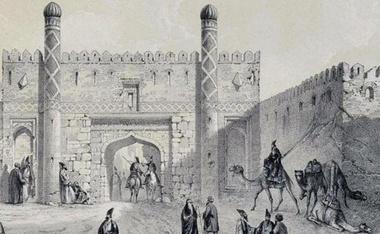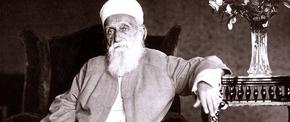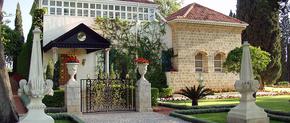The views expressed in our content reflect individual perspectives and do not represent the authoritative views of the Baha'i Faith.
Once more, the order of banishment for Baha’u’llah came from the Ottoman capital city of Istanbul. This time, in an attempt to separate Baha’u’llah from the Baha’is, the order of exile disclosed no destination.
The Baha’i Faith, spreading widely and rapidly, caused religious and political officials in Persia and the Ottoman Empire to do everything they could to banish Baha’u’llah further and further away.
RELATED: How Baha’u’llah’s Followers Learned Not to Fear Death
Ultimately, he was exiled to the most dire, distant destination in that part of the world – the feared penal colony of the walled prison-city of Akka in Palestine. The terrible conditions there in his final exile would prompt Baha’u’llah to name it the “Most Great Prison.” Baha’u’llah wrote “He Who hath come to build anew the whole world, behold, how they … have forced Him to dwell within the most desolate of cities!”
Banished from his birthplace in Persia, Baha’u’llah spent ten years in exile in Baghdad, and was then forcibly exiled to Constantinople (now Istanbul), and then exiled again to Adrianople (now Edirne). One morning the family awoke to find the house of Baha’u’llah in Adrianople surrounded by soldiers. As the soldiers carried out the order for exile, many of the Baha’is suffered cruel interrogations. In his writings Baha’u’llah described the situation as his followers were taken to prison and:
… were left on the first night without food …. The people surrounded the house, and Muslims and Christians wept over us …. We perceived that the weeping of the people of the Son (Christians) exceeded the weeping of others — a sign for such as ponder.
One of the exiles recalled that, “A great tumult seized the people …. Some expressed their sympathy, others consoled us, and wept over us …. Most of our possessions were auctioned at half their value.” Several foreign ambassadors in Adrianople went to Baha’u’llah and offered to negotiate a reprieve with the Ottoman Sultan. Baha’u’llah expressed his appreciation for their kindness but refused all offers of political support.
On August 12, 1868, the government’s soldiers escorted Baha’u’llah, his family, and the other exiles by carriage to Gallipoli. At first, no one told Baha’u’llah and his companions where their exile would take them, or even if his family and followers would be separated and sent to different places. Later, the authorities announced that Baha’u’llah and seventy of his followers would go to the remote penal colony of Acre (now known as Akka) in Palestine.
Baha’u’llah warned his followers of the dangers that lay ahead, stating that “this journey will be unlike any of the previous journeys.” He said that any of his followers who felt unprepared to face extreme hardship should “… depart to whatever place he pleaseth, and be preserved from tests, for hereafter he will find himself unable to leave.” But all the companions of Baha’u’llah chose to go with him into exile, accepting whatever lay ahead rather than any separation from Baha’u’llah.
From Gallipoli, the exiles steamed across the sea to Alexandria, Eygpt. Another steamer took them from Alexandria to Haifa, Palestine (now in northern Israel). From there, a sailing vessel ferried them across the bay to the prison-city of Akka. The combined effects of the heat, sea sickness, the filthy conditions of the ships, and improper food exhausted all of the exiles.
RELATED: From Prison to Poverty and Exile: Baha’u’llah’s Journey
They arrived in Akka during the brutal summer heat of August, 1868, but the port had no dock. The Baha’i men, forced to wade from the boat to the shore, carried the women, one by one, on a chair held above the waves. A rough crowd gathered on the shore, jeering Akka’s newest prisoners and their leader, who they denounced as the “god of the Persians.”
Akka, called St. Jean d’Acre by the Crusaders centuries before, had become under the Ottoman Turks a flea-infested, malarial, desolate penal colony with a reputation for unhealthy air and water. A local proverb said that a bird flying over Akka would fall dead out of the sky, and those imprisoned there knew they faced a death sentence because of the terrible conditions.
The jailers marched the exiles – men, women, and children – to a barracks within the walled city. Baha’u’llah’s young daughter Baha’iyyih recalled the ordeal:
When we had entered the barracks the massive door was closed upon us and the great iron bolts thrown home. I cannot find words to describe the filth and stench of that vile place. We were nearly up to our ankles in mud in the room into which we were led. The damp, close air and the excretions of the soldiers combined to produce horrible odors. Then, being unable to bear more, I fainted. As I fainted, those about me caught me before I fell; but because of the mud and filth there was no place upon which I could be laid. On one side of the room was a man weaving a mat for the soldiers. One of our friends took this mat and I was placed upon it. Then they begged for water, but they could not get it. The soldiers would permit no one to go out. There was a pool of water on the dirt floor, in which the mat-maker had been moistening his rushes. Some of this water was dipped up and strained and put to my lips. I swallowed a little and revived; but the water was so foul that my stomach rejected it, and I fainted again.
This horrible prison, with its privation, loathsome conditions, and disease, opened a new chapter in the cruel repression of Baha’u’llah’s new Faith – and paradoxically would later become the brilliant, beckoning hub of the global Baha’i community.
















Comments
Sign in or create an account
Continue with Googleor